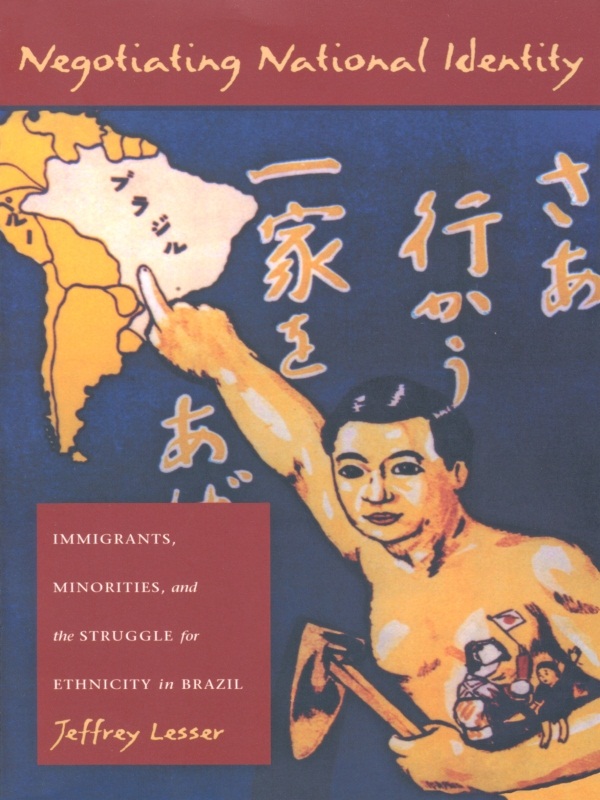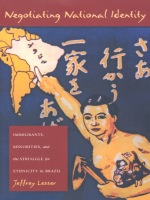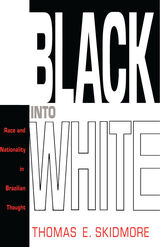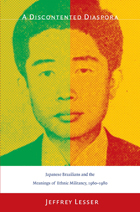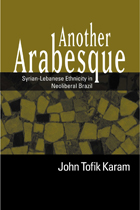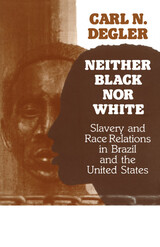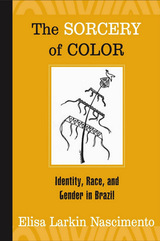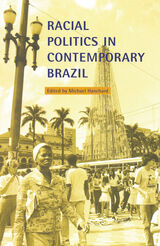Negotiating National Identity: Immigrants, Minorities, and the Struggle for Ethnicity in Brazil
Duke University Press, 1999
Cloth: 978-0-8223-2260-3 | eISBN: 978-0-8223-9929-2 | Paper: 978-0-8223-2292-4
Library of Congress Classification F2659.A1L47 1999
Dewey Decimal Classification 305.800981
Cloth: 978-0-8223-2260-3 | eISBN: 978-0-8223-9929-2 | Paper: 978-0-8223-2292-4
Library of Congress Classification F2659.A1L47 1999
Dewey Decimal Classification 305.800981
ABOUT THIS BOOK | AUTHOR BIOGRAPHY | REVIEWS | TOC | REQUEST ACCESSIBLE FILE
ABOUT THIS BOOK
Despite great ethnic and racial diversity, ethnicity in Brazil is often portrayed as a matter of black or white, a distinction reinforced by the ruling elite’s efforts to craft the nation’s identity in its own image—white, Christian, and European. In Negotiating National Identity Jeffrey Lesser explores the crucial role ethnic minorities from China, Japan, North Africa, and the Middle East have played in constructing Brazil’s national identity, thereby challenging dominant notions of nationality and citizenship.
Employing a cross-cultural approach, Lesser examines a variety of acculturating responses by minority groups, from insisting on their own whiteness to becoming ultra-nationalists and even entering secret societies that insisted Japan had won World War II. He discusses how various minority groups engaged in similar, and successful, strategies of integration even as they faced immense discrimination and prejudice. Some believed that their ethnic heritage was too high a price to pay for the “privilege” of being white and created alternative categories for themselves, such as Syrian-Lebanese, Japanese-Brazilian, and so on. By giving voice to the role ethnic minorities have played in weaving a broader definition of national identity, this book challenges the notion that elite discourse is hegemonic and provides the first comprehensive look at Brazilian worlds often ignored by scholars.
Based on extensive research, Negotiating National Identity will be valuable to scholars and students in Brazilian and Latin American studies, as well as those in the fields of immigrant history, ethnic studies, and race relations.
Employing a cross-cultural approach, Lesser examines a variety of acculturating responses by minority groups, from insisting on their own whiteness to becoming ultra-nationalists and even entering secret societies that insisted Japan had won World War II. He discusses how various minority groups engaged in similar, and successful, strategies of integration even as they faced immense discrimination and prejudice. Some believed that their ethnic heritage was too high a price to pay for the “privilege” of being white and created alternative categories for themselves, such as Syrian-Lebanese, Japanese-Brazilian, and so on. By giving voice to the role ethnic minorities have played in weaving a broader definition of national identity, this book challenges the notion that elite discourse is hegemonic and provides the first comprehensive look at Brazilian worlds often ignored by scholars.
Based on extensive research, Negotiating National Identity will be valuable to scholars and students in Brazilian and Latin American studies, as well as those in the fields of immigrant history, ethnic studies, and race relations.
See other books on: Asians | Elite (Social sciences) | Ethnicity | Minorities | National characteristics, Brazilian
See other titles from Duke University Press
